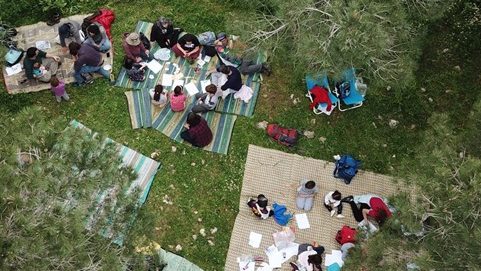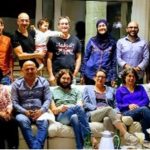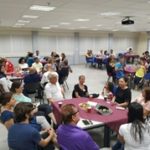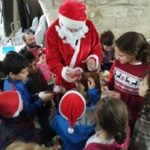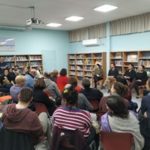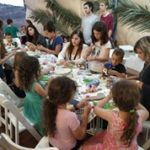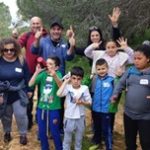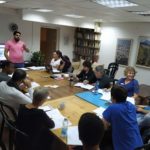Bustan, a shared Arab-Jewish Community project by SFP graduate Dan Segal
Dan Segal is an activist and graduate of a School for Peace shared cities leadership courses. These courses, which have been conducted over the last four years, are facilitated and organized by Ibrahim Egbareye and Roi Zilberg of the School for Peace.
He shares with us the following interesting project that he was instrumental in founding.
Bustan Shared Arab-Jewish Community in Nof Hagalil
Active since 2018, Bustan seeks to develop a shared Arab-Jewish community. The project is open for all Nof Hagalil residents and focuses on developing shared leadership, creating shared culture, introducing diverse and on-going occasions for encounter, and opposing racism. The project’s annual cost is NIS 270,000.
Tikkun – A Center for Gathering, Education and Social Change, was established in 1999 by graduates of the youth movement Ha’Machanot-Ha’Olim. The organization supports and guides the process of establishing urban kibbutzim, educators’ communities, which operate in the geographic and social periphery of Israel to drive social change in the local and national levels. Each year, over 25,000 children, youth and adults of varied backgrounds take part in our programs, which include educational club houses for children and youth at risk, educational reinforcement, seminars, and more.
Bustan – Shared Arab-Jewish Community, a joint venture of Tikkun and residents of Nof Hagalil, was conceived out of the will to create a Shared City, in which positive daily interactions between Jews and Arabs of the various communities occur; a city whose residents share feelings of pride, belonging, and well-being; a city whose material and cultural resources are distributed fairly.
In Nof Hagalil (formerly Nazareth Illit), the different populations of the entire Israeli society meet, in the delicate makeup of neighborly relations, on the same street, in the same building. Jews and Arabs (Christians and Muslims), immigrants and veterans, secular, religious and ultra-Orthodox. While the city’s varied human composition constitutes a unique asset, and presents many an opportunity for the emergence of a vibrant culture, the multitude of languages and lifestyles might entail estrangement. Meanwhile, opportunities for constructive encounter between the various communities are conspicuously lacking, while barriers hindering the advancement of community spirit are apparent.
We propose a bottom-up process of change involving the creation of a shared community with the partnership of municipal institutions. According to our theory of change, increased familiarity and the introduction of shared everyday-interfaces among a gradually increasing part of the city’s population, would improve the atmosphere and discourse in the city, and influence decision makers. We hope that such changes would prompt institutional changes, resulting in a more equitable distribution of material and cultural resources, and official consideration of shared society.
Active since 2018, our project seeks to develop a shared Arab-Jewish community. Bustan shared community is a network of meaningful and long-lasting social and cultural bonds built among a gradually increasing circle of active Arab and Jewish residents of Nof Hagalil.
The project encompasses four main channels:
- Developing shared leadership. Our management and leadership teams are composed of both Arab and Jewish members of the community. At this stage we have two shared leadership fora: a shared management team (1 Arab member, 1 Jewish member) responsible for planning and strategy, and a shared leadership group (10 Arab members, 10 Jewish members), which organizes community events. The leadership group holds a monthly meeting, in which dialogue, shared learning, and group forming activities take place.
- Creating a shared culture. We create multiple opportunities for encounter between Arabs and Jews around the various religious/ethnic festivals, art, sports, music, film, theater, and lectures. We use these cultural occasions in order to strengthen our partnership with the city’s chain of cultural centers, thereby creating an important outlet for equitable distribution of the city’s material and cultural resources.
- Establishing diverse platforms for continuous encounter. In addition to community events, we hold various weekly courses and activities, which enable meaningful and long-lasting encounter for families and individuals.
- Countering racism and violence. We react to racist phenomena in the public sphere by standing with victims and publicly condemning racist incidents in Nof Hagalil and its immediate vicinity. We work to change the public discourse in the city through spreading messages of non-violence in social and traditional media.
Bustan activities are open for all Nof Hagalil residents. This year we expect some 1,000 people to participate in our community events; 200 people in courses or on-going activities, and 30 people in leadership fora.
We take pride in the fruits of Bustan’s shared activity, and wish to further develop it in the coming year, make new connections and reach more Nof Hagalil residents. We believe that our mode of operation might make a real difference in the city, and constitute a model for activity in other mixedcities in Israel.
[gview file=”https://sfpeace.org/wp-content/uploads/2020/01/Bustan-eng.pdf”]

